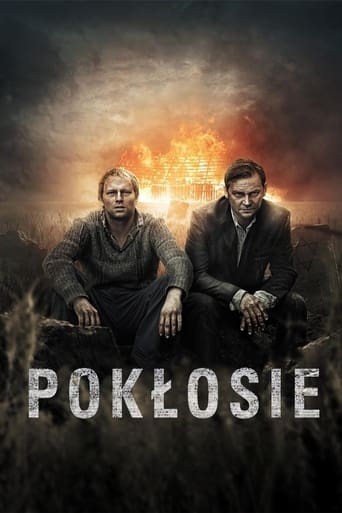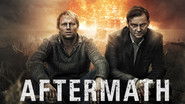reviews1958
There were 5-6 MILLION Jews killed in the Holocaust. So the one reviewer saying "This movie's theme has been done to death. If you've seen one third Reich movie you've seen them all more or less." and it has been "82 years since this happened...five movies per year done" about this horrible near-extermination. Are you kidding me? If you took only 5,000,000 Jewish lives and divided it by 82 years that would be 60,000+ thousand movies that NEED to be made per year about any and all horrific acts these monsters caused.My review about this movie...it's not a thriller. It's a puzzle. It's an in-depth thought provoking movie that every person alive needs to see. Santayana wrote (in The Life of Reason, 1905) "Those who cannot remember the past are condemned to repeat it." I had no idea this happened in many cities and villages throughout Europe and beyond. IF these stories are not told, even on the simplest terms, our children and future generations are condemned to repeat it. The movie may be a slow go but it is a well acted and well written movie with a haunting soundtrack.God help the souls who choose to forget the past. We have a very real evil living among us and this could certainly happen again, at any moment.
Chris Blachewicz
On its own, and to people unfamiliar with Jedwabne's past, this might seem like a decent movie. But once you get to know what really happened and then watch the movie, you're only left with bewilderment, or disgust.While in the movie the whole village (and all of its ancestors) have dirt on their hands and desperately try to shut down the inconvenient truth from coming out, in reality the excavations in Jedwabne were stopped by the Jews. As more and more proof came out clearly proving that Germans orchestrated that bestial crime, interest in continuing the search was substituted with demands to stop it, basing it on not wanting to further profanate the dead bodies. And it came from those same Jewish organizations that pushed hard for excavating. The truth turned out to be less spicy than people thought - if we can even sum up like that such a tragedy.The film made quite a storm in Poland, and for good reason. Anti-Polish movies that show us in the worst possible light are getting financed easily from public money while the ones that try to be as faithful to the real history and patriotic movies in general are regularly denied funding. For Polish people, aided by our own government, to produce a movie that blatantly lies about history to put us in the worst possible light while claiming to do the opposite (supposedly coming to terms with dark past) sounds like a cruel joke, but that's our reality and people grow more conscious and angered with it every year.If you want to watch it as a non-factual movie for its story and are not interested in historical realism, it's probably worth it, it's decent. Still, a movie that not only addressed history, but a highly sensitive and painful subject, must be judged by how close it sticks to what we really know about the topic. After all, people treat movies that refer to history as a source of information about the world that we live in. So when such drastic deviation is being made, even if it would be an Oscar-worthy material (which it's far from), its core is still rotten and that has to reflect on rating. As a fictional movie, 6.5/10. With "historical lesson" included, 2/10.
riwam
Besides West Germany under Konrad Adenauer and later governments, no other European country did any serious effort to admit their role in Jewish deportation and final annihilation during the Nazi era of WWII. East Germany persistently denied having had anything to do with it and Austria still considers itself as having being "occupied" by the Nazis instead of the truth, which is having joyful joined Hitler's Germany as seen in old news reels with hundreds of thousands enthusiastic people in the street parades, welcoming the Germans troops at the "Anschluss".Poland (as France, Switzerland and other countries) preferred to ignore any kind of collaboration or sympathy for the Nazi regime.Switzerland closed his frontiers to countless Jews, which was tantamount to sent them back to a clear death.The Vatican accepted a very small number of Jews in the Vatican State as alibi, but did not intervene at Hitler as it should morally have done. Pope Pius XII is supposed to have believed that the Jews historically deserved in a certain way that punishment, but of course the Vatican denies it.France had to wait very long time until President Chirac was the first who had the courage to recognize the French active collaboration in the deportation of French Jews (including hundreds of very small children!) to the German death camps. He apologized in the name of the French nation. A noble gesture!His predecessor President Mitterand (who had a dubious role during the occupation, although supposedly having been a "socialist") had before Chirac strongly denied any guilt of his country and had found "no reason to apologize". He even protected during his presidency some "old friends" who were directly responsible for having organized those deportations, people who had made even more "efforts" to carry out their sinister task, than what the Nazis requested from them!At the time of the hopeless, desperate and heroic revolt at the Jewish Getto of Warsaw, the Polish underground partisans refused to supply the Jewish fighters with weapons or help them in any way... unless they paid for it which was not possible since within the Getto they were starving to death!If the Germans undertook to get rid of the Polish Jews, well, it was not such a bad idea after all. In any case not a Polish problem at all!. "The less Jews in Poland, the better", was the general feeling in Poland during the Nazi occupation (with some noble exceptions of very courageous Poles who risked their own life to hide Jews). Besides, as shown in the film, it allowed many Poles to get hold of the houses, land properties and other possessions of all the "disappeared" Jews, something which of course also took place in other European countries.This film, made by a (non Jewish! very courageous) film maker, created unsurprisingly a great turmoil in Poland. Wladyslaw Pasikowski was even accused to be a "a polish hater". However the facts it tells are entirely true although the names, for obvious reasons, were changed and some details added or modified for cinematographic reasons.This film, together with "Schindler's List" is a MILLESTONE in the films describing WWII and the Holocaust. No doubt it is very difficult to accept for Polish citizens. They will willingly see the film about the Katyn massacre organized by Stalin (a film in which Wladyslaw Pasikowski collaborated as well) since it concerned Polish victims. However most of them do not want to know anything about the sad role that Poland played towards their Jews during the German occupation (and long before with "Numerus Clausus" for Jews in educational institutes, restriction where Jews were allowed to live, countless Pogroms, etc.).Whoever wants to have a comprehensive view of the Nazi era in Europe SHOULD see this film.The arguments others brought here against this film are in my opinion fallacious. No film is perfect and no historical film is 100% identical to the facts it tells. However even if some events might be slightly changed, the true point of the film is to reveal the attitude of most Poles during the Nazi occupation towards their Jewish fellow citizens. Unfortunately, although the number of Jews presently living in Poland can easily be neglected, strangely enough Antisemitism is still very strong in present day Poland. (Antisemitism without Jews!!!!) An interesting example is for instance Lech Walesa. He is no doubt a hero from the Polish point of view but that does not change his negative feelings towards Jews. Antisemitism (and his present forms of Antiisraelism, Antizionism and so on) are still a sad reality with different degrees of violence in most countries in the world in the 21th century.Antisemitism in Poland is a many hundred years phenomenon with a special, additional fact non present in other European countries in which Pogroms against Jews also took place, the strong Polish catholicism and the old catholic accusation "Jews killed Jesus" taken seriously by the illiterate people (ignoring that actually the Romans crucified Jesus and that Jesus was himself a Jew!).How many people know for instance that at his time, Chopin refused to play in a concert hall... if he learned that Jews were among the public? That does not diminish at all, of course, the great musical value of Chopin's music but just shows that he also was "a true Pole", from this dark point of view as well. To sum up, this is an astounding film and well worth to see!!! Whoever sees it without being in advance biased against it, will not forget it!
CinemaClown
Inspired by the true Holocaust related incident that took place in Poland during the Second World War, Aftermath tells the story of two brothers who unearth a shocking secret about their hometown that hasn't been spoken of ever since the war ended. Franciszek Kalina has returned from Chicago to his hometown after decades & discovers that his brother Józef has been shunned by the entire community for acquiring many Jewish tombstones which were once used as pavement for a now abandoned road. As the residents grow more hostile towards them, the brothers attempt to find out what really happened to all the Jewish residents only to discover a truth that'll scar them for life.Brilliantly directed by Władysław Pasikowski, the first act of the film is kind of slow, less informative & tells a completely different story than what's presented in the second & third acts. Nicely photographed, superbly acted, finely scored & becoming potent in the middle of the story from where it feels like this film will explode any moment & eventually does when the devastating secrets about the fate of the town's Jews are finally revealed.On an overall scale, Aftermath (Pokłosie) could've been a better film if it had used a more tighter narrative but nonetheless manages to achieve what it set out to do & brings on the screen a horrifying secret that many around the world still aren't aware of and ends up delivering an even more powerful punch that won't be easily forgotten. Undoubtedly deserving a wider global audience, Aftermath is one film you shouldn't miss out if you're game for Holocaust-related cinema.





